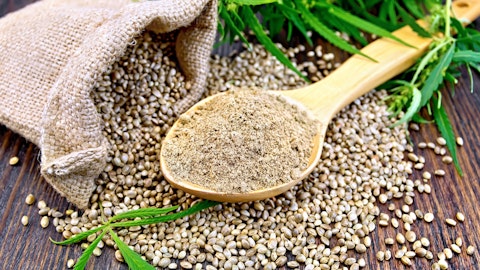Matt Bottomley: Good morning, everyone. Just wanted to first touch base on kind of that first strategic priority. Irwin, you were just sort of talking about it now with respect to some of the organic growth. But on the M&A front, what is the current landscape if we’re looking at the cannabis sector in general and federal illegal environments with respect to what we’re seeing in Canada and international markets? Is this something that you think probably has the least amount of opportunistic assets out there just given some of the headwinds we’ve seen in federal markets? And should we expect maybe more beverage alcohol focus when it comes to M&A allocation? I’m just curious if you have an indication one way or the other.
Irwin Simon: So, I’m going to bring two other people in to talk about that. I have Blair MacNeil here who runs Canada. And I got to tell you I spent some time with Blair and team in Toronto and spent some time with other control boards. It’s five years since cannabis is now legal in Canada. And what we’re seeing is tremendous amount of consumers moving over to the legal market, tremendous amount of consumers partaking in the recreational. You heard us say we sold 20 million pre-rolls. And where that is going? We expect to sell 80 million pre-rolls a year. You see lots of consolidation at retail, much more awareness out there. Listen, there’s still lots of problems in the Canadian market, but I got to tell you for the first time, I’m starting to feel really optimistic about the opportunities there. Blair, you want to add anything to it?
Blair MacNeil: Yeah. So, to your question, Matt, on the opportunity on the M&A side, from an asset standpoint, I think if you look at our portfolio, we’re very well-rounded. I’d say maybe we’ve got a small gap on the edible side, but when you look at the rest of our portfolio, we are very well represented. So, there’s not a lot of assets out there that we would look to acquire over the next period of time. We do have — as Irwin alluded to, all of our facilities are starting to really get up there in utilization and we have availability of some capacity to be able to bring edibles into that. So we’ll look to do that over this next period of time. So, at least from a Canadian perspective, I’m happy with the growth we’re seeing in the market. I’m happy with where the industry is, not without its challenges, as Irwin said, but from an M&A standpoint, we don’t see a lot of opportunity there.
Irwin Simon: Before I pass it to Denise about Europe, we’re real excited about the beverage category. If you come back and think one of the biggest opportunities and you walk into cannabis stores today, there’s a small fridge in there with drinks at $7, $8. But think about how the beverage category within the world today, you look at the craft beer category, $280 billion, and you come back and think this is a whole new category and the opportunities there. We have two facilities. We’re the leader in the beverage business, and everybody wants to figure out what’s the right way to roll this out and merchandise it. And my hope one day that you would be able to go into a beer store, a convenience store, or go into a bar, and it would be on tap. So that to us is one of the biggest opportunities. Internationally, medical has tremendous opportunities. Denise?
Denise Faltischek: Thanks, Irwin. Yeah, so internationally, if you look at Europe first, really the only cannabis market today is a medical cannabis market. And Germany still remains the largest market within Europe. However, we do see some countries that are coming online and developing very quickly. The regulations are still — as we all know, are still really shaping out. We are looking to see medical cannabis in Germany become de-scheduled as a narcotic and become a regular medicine that can be prescribed. And so, if we look at our business, we really see like our business is very nascent today and is still developing. And so, we are evaluating where do we have gaps in capabilities and where can potentially M&A fill in those gaps.




